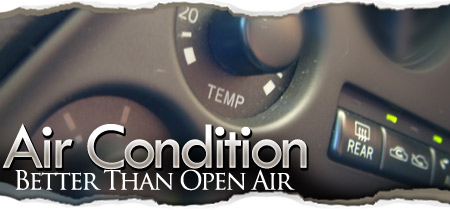
Using Air Conditioning on the Highway
More Fuel Efficent
As
the summer temperatures remain hot and gas prices remain high,
motorists should remember that vehicles can get better fuel efficiency
with their windows closed and air conditioning on when at highway
speeds. However, during stop-and-go traffic it's more fuel efficient
to open the windows, according to the Automotive Aftermarket Suppliers
Association (AASA).
With the windows
closed on the highway, the aerodynamics are improved as there
is less drag on the vehicle, according to Frank Hampshire, AASA
director of market research. He noted that studies by Volvo and
other automakers have shown that a cooler, drier and quieter cabin
can reduce fatigue on longer trips and help a driver stay alert
and relaxed for longer periods of time.
"In city driving,
you'll see a slight fuel economy advantage by opening your windows,
but the use of air conditioning at higher speeds can produce a
fuel savings," Hampshire said. "There are other ways
to improve fuel efficiency with the top advice being to
have your vehicle serviced regularly and driving wisely."
Some consumers with malfunctioning car air conditioners may roll the windows down rather than make repairs, but that's a false economy, according to Hampshire. "The fuel efficiency savings may not be enough to pay for the repair of a non-functioning air conditioner. However, for motorists with malfunctioning systems who have decided to endure the heat, fuel savings make air conditioner system repair worth considering," he said. "A functioning air conditioner system might be necessary for proper functioning of the defroster in late model vehicles."
According to the U.S. Environmental Protection Agency (EPA), there are several other tips a motorist can follow to improve gas mileage, including:
-
Avoid carrying unnecessary items in the trunk. Extra weight decreases gas mileage. Also, reduce drag by placing items inside the car or trunk rather than on roof racks.
-
Keep tires inflated and aligned. Periodic wheel alignments and keeping tires inflated to the maximum recommended pressure can improve the gas mileage of a vehicle.
-
Get regular engine tune-ups and car maintenance checks. Tune-ups improve performance of the vehicle as well as gas mileage. Incorrect fuel ratio, bad spark plugs and incorrect spark timing can have a huge effect on gas mileage.
-
Avoid stop and go traffic by taking an alternative route that may be less congested.
-
Use a good engine oil, preferably a synthetic or standard oil treated with a friction reducing oil additive. These have been known to improve fuel economy by as much as 12 percent.
-
Use your cruise control whenever possible.
The Motor & EquipSment Manufacturers Association (MEMA) established AASA in 2002 as its aftermarket segment association to exclusively serve manufacturers of aftermarket components, tools and equipment and related products. For more information, go to After Market Suppliers.
(Source: AASA)